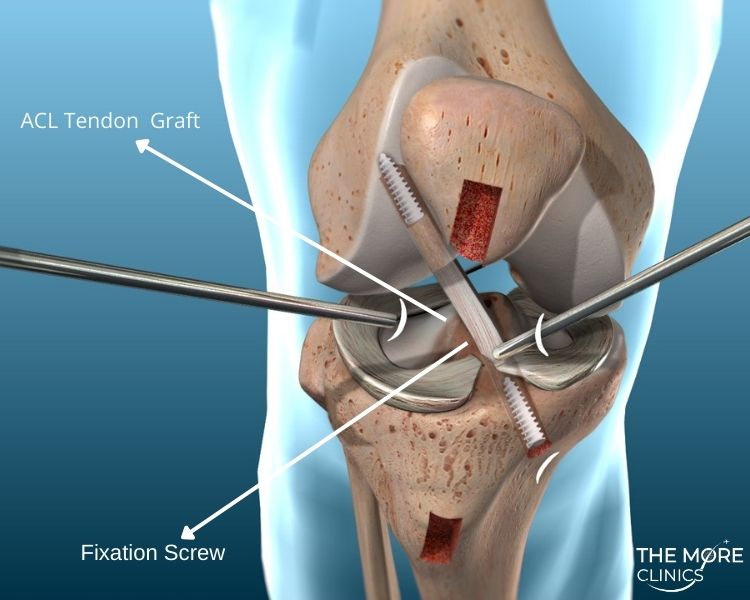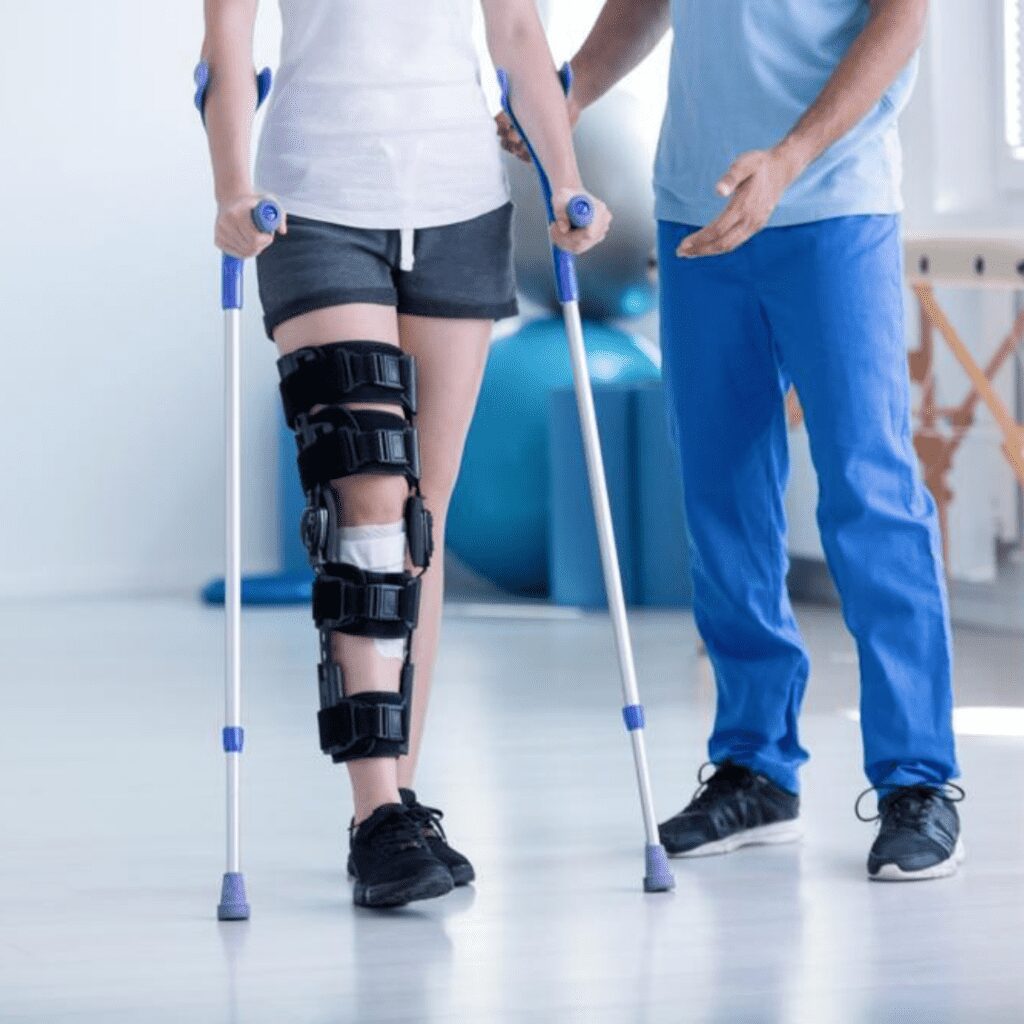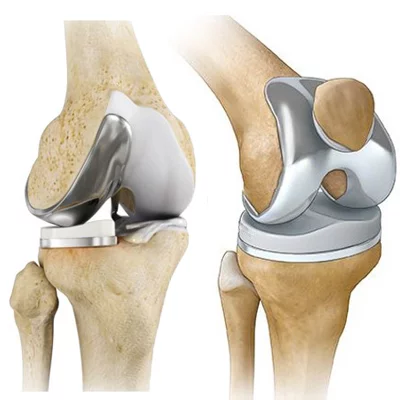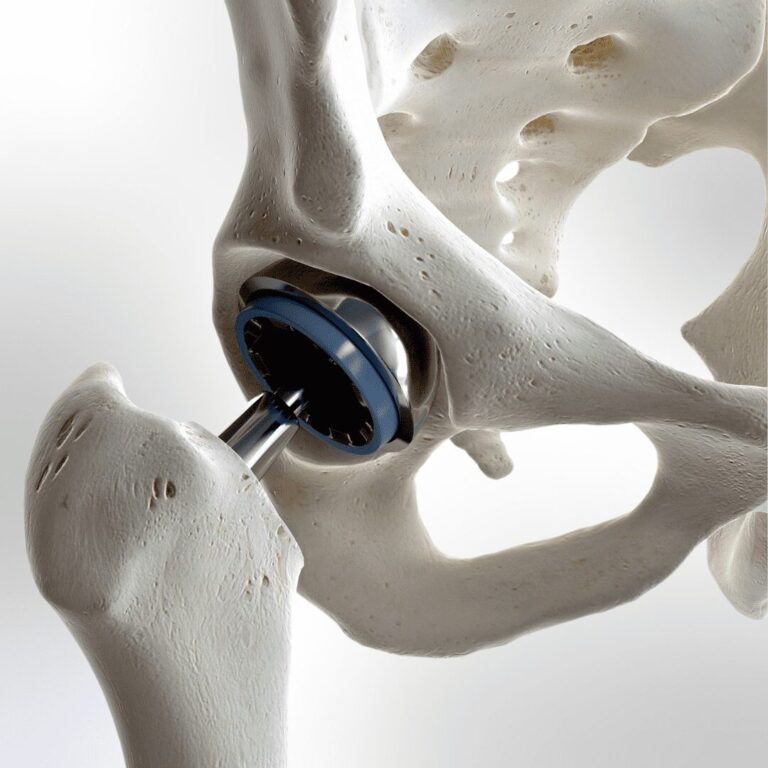ACL Reconstruction Surgery: All You Need to Know
A torn anterior cruciate ligament (ACL) is a significant knee injury, particularly for athletes, although it can affect anyone. ACL reconstruction is a surgical procedure aimed at replacing a crucial ligament in the knee. This surgery is typically recommended for individuals with ACL injury to restore proper knee function. Comprehending the path of ACL surgery holds immense importance, and The More Clinics takes pride in offering this all-encompassing guide. We warmly invite you to delve into every facet, empowering yourself to make informed choices regarding your orthopedic well-being. Discover insights on Acl Surgery in Turkey and our comprehensive Acl Surgery Cost Guide.
What Is ACL Reconstruction Surgery?
ACL reconstruction is a surgical procedure that replaces the torn anterior cruciate ligament (ACL) within the knee with a graft. The ACL is a crucial ligament that stabilizes the knee joint and prevents excessive forward movement of the tibia (shinbone). When this ligament is torn, it can lead to instability and pain in the knee.
What is ACL and Its Function
The Anterior Cruciate Ligament or ACL is one of the four main ligaments that connect the bones in your knee joint. It runs diagonally from the back of the femur (thighbone) to the front of the tibia (shinbone).
Its primary function is to stabilize the knee joint and prevent excessive forward movement of the tibia. The ACL also helps control rotational movements of the knee, making it essential for activities that involve quick changes in direction, such as running, jumping, or cutting.

ACL Injury Symptoms
An ACL injury is typically accompanied by a loud “popping” sound at the time of injury. Other common symptoms include severe pain and swelling in the knee, difficulty bearing weight on the affected leg, and instability or “giving way” of the knee. If you experience any of these symptoms, it is crucial to seek medical attention immediately as delaying treatment can lead to further damage and complications.
Ideal Candidates for ACL Reconstruction Surgery
The ideal candidates for ACL reconstruction surgery typically include:
- Active individuals: Those who frequently participate in sports or physical activities that require pivoting, jumping, or hard cuts.
- Individuals experiencing instability: People who experience knee instability during daily activities.
- Failed non-surgical treatments: Those who have tried non-surgical treatments, such as physical therapy or bracing, with no success.
- Occupational necessity: Individuals who require a stable knee for work, such as military personnel, firefighters, or athletes.
- Patients with multiple knee injuries: Patients with injuries to more than one knee ligament, the cartilage, or meniscus might also be suitable candidates.
- Long-term knee health: Patients who want to prevent future arthritis or meniscus tear might consider surgery.
Alternative Treatments to ACL Surgery
While ACL reconstruction is often recommended for patients with severe ACL injuries, various non-surgical alternatives might prove beneficial for certain individuals. These options aim to manage symptoms, facilitate healing, and restore stability in the knee.
- Physical Therapy: This is a frontline non-surgical treatment for ACL injuries. A well-structured physical therapy program can strengthen the muscles around the knee, improve balance, and promote stability. Sturdy leg muscles can compensate for the torn ACL, reducing knee instability, enhancing mobility, and reducing the risk of further injury.
- Bracing: Using a knee brace can provide additional support to the injured knee. Braces specifically designed for ACL injuries can help limit knee movement, preventing further damage. However, they are typically used in conjunction with physical therapy to enhance results.
- Lifestyle Modifications: For individuals with lower activity levels or those who can avoid sports and activities that stress the knee, lifestyle modifications can be an effective alternative. Changes might include switching to low-impact activities such as swimming or cycling, and incorporating strength training exercises that focus on the lower body.
- Medications: Non-steroidal anti-inflammatory drugs (NSAIDs) can be used to manage the pain and inflammation associated with ACL injuries. However, these do not address the root cause of the problem and are primarily used for symptom management.
While these non-surgical alternatives can be effective, their success largely depends on the severity of the injury, the individual’s activity level, age, and overall health. They might not be as effective in athletes or highly active individuals due to the high demand placed on the knee. Always consult your healthcare provider to determine the best course of treatment for your specific needs and circumstances.
What Will Happen if I Decide Not to Have the Operation?
Choosing not to have ACL reconstruction surgery is a personal decision, and it is essential to understand the potential consequences of this choice. Without surgery, the injured ACL will not heal on its own, and the knee will likely remain unstable. This can lead to recurrent episodes of pain, swelling, and instability during daily activities or sports participation.
Moreover, without proper treatment and rehabilitation, a torn ACL can also increase the risk of developing secondary injuries, such as meniscus tears, cartilage damage, or even early-onset arthritis.
Benefits of ACL Surgery Turkey
ACL reconstruction surgery offers several benefits that can significantly improve the quality of life for patients with severe ACL injuries. These include:
- Improved knee stability: ACL reconstruction can effectively restore stability in the knee, reducing episodes of the knee “giving way” during everyday or sporting activities.
- Return to sports and physical activities: The surgery enables patients to return to their previous levels of activity, including participation in sports that require running, pivoting, and jumping.
- Resolution of pain and swelling: Surgical repair of the torn ACL can alleviate the pain and swelling associated with the injury, enhancing comfort and mobility.
- Prevention of secondary knee injuries: By stabilizing the knee joint, ACL reconstruction can reduce the risk of secondary injuries, such as meniscus tears or cartilage damage.
- Protection against future degenerative changes: The surgery can help prevent the onset of degenerative knee conditions, such as osteoarthritis, which are more common in patients with untreated ACL injuries.
- Improved quality of life: Overall, ACL reconstruction can significantly improve the patient’s quality of life by enabling them to resume their normal activities without pain or instability.
Potential Risks of Acl Reconstruction Surgery
As with any surgical procedure, ACL reconstruction surgery carries certain risks and potential complications. These include:
- Infection: There’s a small risk of infection at the surgical site. This is usually treatable with antibiotics, but in rare cases, may require further surgery.
- Bleeding and Blood Clots: As with all surgeries, there’s a risk of bleeding during the operation. Blood clots in the leg veins are also a possibility. These clots can be dangerous if they dislodge and travel to the lungs, causing a pulmonary embolism.
- Nerve Damage: There’s a risk of accidental nerve damage during surgery. This could result in numbness or weakness in the leg.
- Stiffness: Some patients may experience stiffness in the knee after surgery. This is often temporary and can be improved with physical therapy.
- Re-tearing the ACL: There is a chance that the reconstructed ACL could be torn again, particularly in individuals who return to high-impact sports or activities that put a lot of stress on the knees.
- Knee Weakness or Instability: Some patients may continue to experience weakness or instability in the knee after surgery. This could lead to difficulties with certain activities or movements.
- Pain: Post-surgical pain is common, but for a few, it may persist longer than usual.
Step-by-Step Acl Surgery Turkey
ACL reconstruction surgery is a procedure that involves replacing the torn ACL with a graft tissue. This is generally performed under general anesthesia, and the steps are as follows:
- Preparation: The surgeon will make incisions in the knee area. These are usually small, as most ACL reconstruction surgeries are performed arthroscopically.
- Graft Preparation: The surgeon prepares the graft tissue that will replace the torn ACL. This can be taken from your own body (an autograft, such as the patellar tendon or hamstring tendon) or from a donor (an allograft).
- Removal of Damaged ACL: The surgeon will carefully remove the damaged ACL, while preserving the surrounding knee structures.
- Graft Placement: The graft is then positioned in the site of the previous ACL, and it is secured in place with special screws or other fixation devices.
- Closure: Once the graft is properly positioned and secured, the surgeon will close the incisions.
Surgery of Acl Injury Recovery Timeline and What to Expect
The recovery timeline post-ACL reconstruction surgery is variable, depending on factors such as the individual’s overall health, the extent of the injury, and commitment to physical therapy. Here’s a general outline of what you might expect:
- Weeks 1-2: The focus during this initial phase is to reduce inflammation and pain, regain range of motion, and restore quadriceps control. You’ll likely be using crutches and wearing a knee brace for support.
- Weeks 2-6: Physical therapy will continue, with a focus on improving strength and balance, and increasing the range of motion without pain. Additionally, patients might be able to start cycling on a stationary bike.
- Weeks 6-12: During this phase, patients typically begin to transition away from crutches, and exercises will gradually become more challenging. Walking and swimming can be reintroduced.
- Months 3-6: Improved strength, balance, and endurance are the focus. Light jogging can typically be initiated around the fourth month, and sports-specific exercises can be introduced in the fifth and sixth months.
- Months 6-9: Progression to running and jumping, as well as a return to light sports activities may be possible, depending on the individual’s progress.
- Months 9-12: By this stage, most patients can return to their pre-injury level of sports participation, but this varies between individuals.
Remember, successful recovery from ACL reconstruction surgery is not just about the passage of time, but is largely dependent on dedicated participation in physical therapy, a positive mindset, and adhering to the advice of your healthcare professionals. It’s important to note that rushing the recovery process can increase the risk of re-injury, so patience is key. Always consult your surgeon or physiotherapist before returning to sports or intense physical activities.
Acl Surgery Costs
The costs of ACL (Anterior Cruciate Ligament) reconstruction surgery can be a complex challenge, as they vary based on factors such as the surgical approach, the skill of the surgeon, and differences in healthcare systems. Below, you’ll find approximate estimates of ACL reconstruction surgery costs in different countries:
| Country | ACL Reconstruction Surgery (USD) | Additional Notes |
|---|---|---|
| Acl Surgery Cost in UK | £7,500 – £9,500 | Prices may vary between clinics and cities. |
| Acl Surgery Cost in USA | $20,000 – $29,000 | Costs can significantly differ based on location. |
| Acl Surgery Cost in Canada | $15,000 – $30,000 | Prices may vary between provinces. |
| Acl Surgery Cost in Germany | €14,000 – €20,000 | Costs may vary depending on the clinic’s reputation. |
| Acl Surgery Cost in Ireland | €10,000 – €19,000 | Prices can differ based on the clinic and location. |
| Acl Surgery Cost in France | €11,000 – €19,000 | Costs may be influenced by the surgeon’s expertise. |
| Acl Surgery Cost in Turkey | $5,000 – $10,000 | Generally more affordable; Turkey is a popular destination. |
Notes:
- These are rough estimates, and actual costs may vary.
- Currency exchange rates can impact prices in regions outside the United States.
- Additional expenses like pre-operative tests, post-operative care, and rehabilitation may not be included in these estimates.
- High-profile clinics or renowned surgeons may charge higher fees.
Acl Surgery Turkey as an Affordable and Qualified Option
Turkey has emerged as a favorable destination for ACL reconstruction surgery due to its combination of affordable healthcare services and highly skilled medical practitioners. Equipped with state-of-the-art medical facilities, Turkish hospitals adhere to international healthcare standards, ensuring top-notch care. Additionally, the presence of multilingual medical staff simplifies communication, creating a comfortable environment for international patients. The cost savings in comparison to other countries, coupled with the opportunity to explore the rich Turkish culture and history, further contribute to Turkey’s status as a preferred choice for this surgical procedure.

Last Words from The More Clinics
At The More Clinics, we prioritize your health, recovery, and financial considerations. We provide a cost-effective solution for ACL reconstruction surgery, executed by experienced surgeons and a dedicated aftercare team that guides you through every step of your recovery. Turkey emerges as an affordable and qualified option for this procedure, offering top-tier medical facilities and expertise. We understand that every patient’s journey is unique, and we’re here to provide tailored guidance and support. For more information or to schedule a consultation, contact us today.
GET A FREE CONSULTATION!
Let’s Start Planning Your Treatment %100 Guarantee Results.


